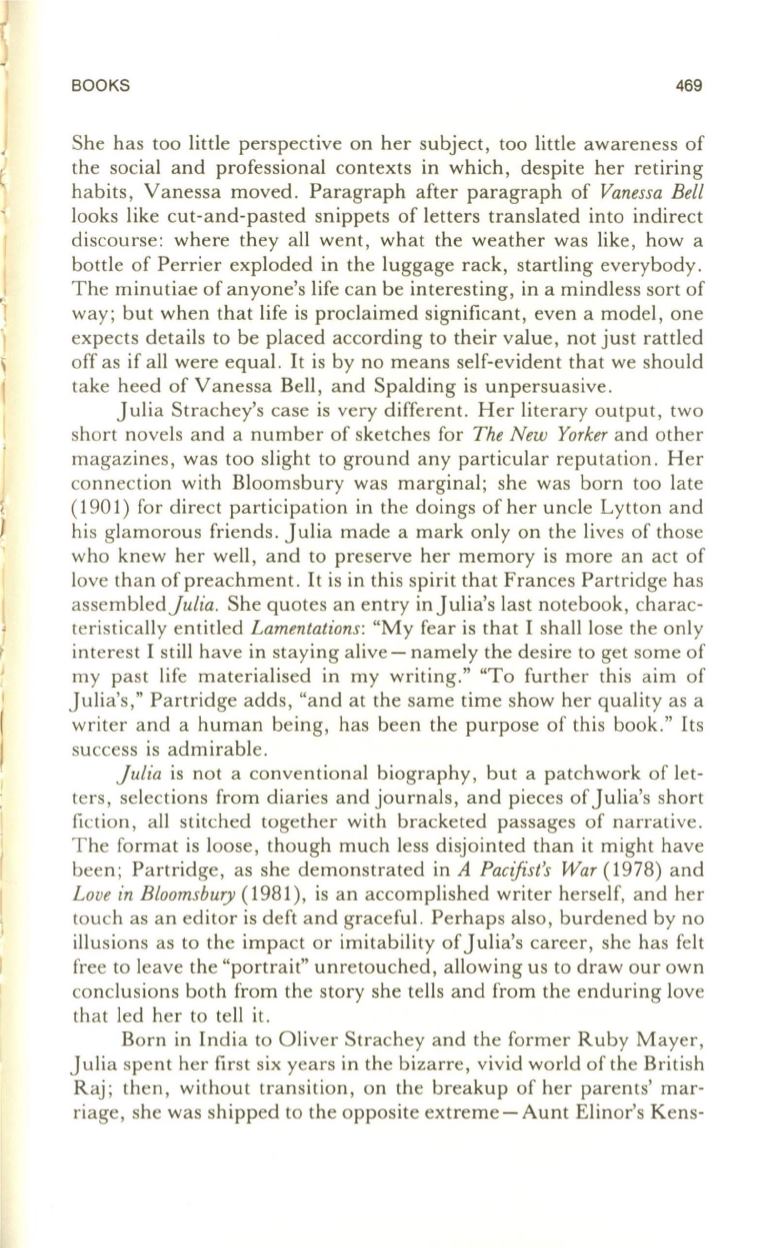
BOOKS
469
She has too little perspective on her subject, too little awareness of
the social and professional contexts in which, despite her retiring
habits, Vanessa moved. Paragraph after paragraph of
Vanessa Bell
looks like cut-and-pasted snippets of letters translated into indirect
discourse: where they all went, what the weather was like, how a
bottle of Perrier exploded in the luggage rack, startling everybody.
The minutiae of anyone's life can be interesting, in a mindless sort of
way; but when that life is proclaimed significant, even a model, one
expects details to be placed according to their value, not just rattled
off as if all were equal.
It
is by no means self-evident that we should
take heed of Vanessa Bell, and Spalding is unpersuasive.
Julia Strachey's case is very different. Her literary output, two
short novels and a number of sketches for
The New Yorker
and other
magazines, was too slight to ground any particular reputation. Her
connection with Bloomsbury was marginal; she was born too late
(1901) for direct participation in the doings of her uncle Lytton and
his glamorous friends. Julia made a mark only on the lives of those
who knew her well, and to preserve her memory is more an act of
love than of preachment. It is in this spirit that Frances Partridge has
assembledJulia.
She quotes an entry in Julia's last notebook, charac–
teristically entitled
Lamentations:
"My fear is that I shall lose the only
interest I still have in staying alive - namely the desire to get some of
my past life materialised in my writing." "To further this aim of
Julia's," Partridge adds, "and at the same time show her quality as a
writer and a human being, has been the purpose of this book." Its
success is admirable.
Julia
is not a conventional biography, but a patchwork of let–
ters, selections from diaries and journals, and pieces of Julia's short
fiction, all stitched together with bracketed passages of narrative.
The format is loose, though much less disjointed than it might have
been; Partridge, as she demonstrated in
A Pacifist's War
(1978) and
Love in Bloomsbury
(1981), is an accomplished writer herself, and her
touch as an editor is deft and graceful. Perhaps also, burdened by no
illusions as to the impact or imitability of Julia's career, she has felt
free to leave the "portrait" unretouched, allowing us to draw our own
conclusions both from the story she tells and from the enduring love
that led her to tell it.
Born in India to Oliver Strachey and the former Ruby Mayer,
Julia spent her first six years in the bizarre, vivid world of the British
Raj; then, without transition, on the breakup of her parents' mar–
riage, she was shipped to the opposite extreme-Aunt Elinor's Kens-


